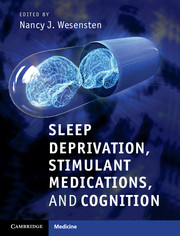Book contents
- Sleep Deprivation, Stimulant Medications, and Cognition
- Sleep Deprivation, Stimulant Medications, and Cognition
- Copyright page
- Contents
- Contributors
- Foreword: Sustaining cognitive performance: a modern imperative
- Preface
- Section 1 Basic Mechanisms: Cognitive Performance and Sleep
- Section 2 Stimulant Reversal of Cognitive Deficits
- Section 3 Alternatives for Sustaining Cognitive Performance During Sleep Loss
- Section 4 Summary and Conclusions
- Index
Section 3 - Alternatives for Sustaining Cognitive Performance During Sleep Loss
Published online by Cambridge University Press: 05 September 2012
- Sleep Deprivation, Stimulant Medications, and Cognition
- Sleep Deprivation, Stimulant Medications, and Cognition
- Copyright page
- Contents
- Contributors
- Foreword: Sustaining cognitive performance: a modern imperative
- Preface
- Section 1 Basic Mechanisms: Cognitive Performance and Sleep
- Section 2 Stimulant Reversal of Cognitive Deficits
- Section 3 Alternatives for Sustaining Cognitive Performance During Sleep Loss
- Section 4 Summary and Conclusions
- Index
Summary
- Type
- Chapter
- Information
- Sleep Deprivation, Stimulant Medications, and Cognition , pp. 184 - 236Publisher: Cambridge University PressPrint publication year: 2012



